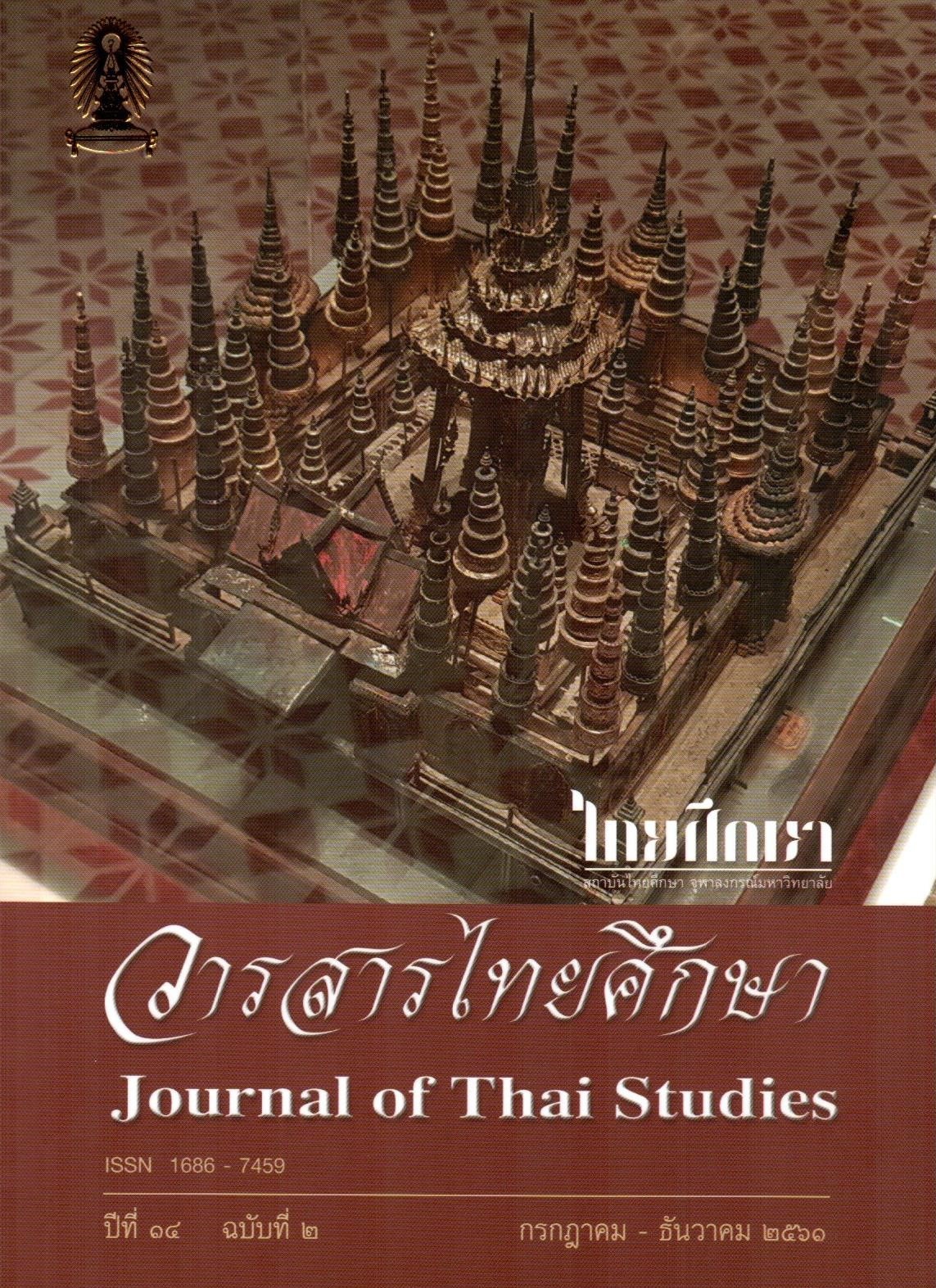Kan Ma Yuean Khong Ying Cha-ra: Creative Process of Making Western Plays for Thai Audiences
Main Article Content
Abstract
The aim of this practiced based research was to explore the creative theatrical process. The objectives of the research were to examine a play script based on the original Western dramatic literature, The Visit, which was adapted using Buddhist doctrines of lustful desires and karma, and to explore the stage directing of the adapted script Kan Ma Yuean Khong Ying Cha-ra that applied expressionist techniques. Thus, the working processes consisted of two stages, the script adaptation and the play direction. The findings reveal that Thai audiences can understand the theme of the play and also the agony of the characters. In conclusion, presenting this play based on Western dramatic literature could be understood by Thai audiences as the literature’s theme is universal and several creative theatrical methods were applied for a better understanding by the audience.
Downloads
Article Details

This work is licensed under a Creative Commons Attribution-NonCommercial-NoDerivatives 4.0 International License.
Journal of Thai studies is licensed under a Creative Commons Attribution-Noncommercial-NoDerivatives4.0 Intenational (CC BY-NC-ND 4.0) licence, unless otherwise stated. Plese read our Policies page for more information on Open Access, copyright and permissions.
References
ภาษาไทย
ดืรเรนมัตต์, ฟรีดิช. (๒๕๓๒). บทละครเรื่องการมาเยือนของหญิงชราและเรื่องโรมูลูสมหาราช แปลจาก The Visit and Romulus the Great โดย อำภา โอตระกูล. กรุงเทพฯ: สำนักพิมพ์จุฬาลงกรณ์มหาวิทยาลัย.
ธรากร จันทนะสาโร. (๒๕๕๘). “นาฏศิลป์หลังสมัยใหม่ของญี่ปุ่น: ประวัติและแนวคิด” ของบุโต. วารสารดนตรีและการแสดง, ๑ (๑) ๘๐-๙๔.
ปราโมทย์ ปาโมชโช. (๒๕๕๕). อริยสัจเพื่อความพ้นทุกข์. กรุงเทพฯ: โรงพิมพ์อักษรสัมพันธ์ (๑๙๘๗) จำกัด.
พรหมคุณาภรณ์. (๒๕๕๙). พุทธธรรม (ฉบับเดิม). กรุงเทพฯ: โรงพิมพ์พระพุทธศาสนาของธรรมสภา.
พุทธทาสภิกขุ. (๒๕๖๐). ตัวกู-ของกู. กรุงเทพฯ: สำนักพิมพ์อมรินทร์ธรรมะ.
วรรณ์ขวัญ พลจันทร์. (๒๕๕๕). “ความแตกต่างแห่งสุนทรีย์: สถานการณ์ปัจจุบันของละครเวทีไทยร่วมสมัย”. วารสารนักบริหาร, ๓๒ (๑), ๒๓-๒๗.
สารานุกรมไทยสำหรับเยาวชน โดย พระราชประสงค์ในพระบาทสมเด็จพระเจ้าอยู่หัว เล่ม ๑๖. (๒๕๓๕). กรุงเทพฯ: สำนักงานกลาง ตึกหอรัษฎากรพิพัฒน์ ในพระบรมมหาราชวัง.
สุทธิชัย หยุ่น. (๒๕๕๖, ๑๒ เมษายน). “เมื่อสังคมไทยมีคนเก่ง แต่ขาดคนดี”. กรุงเทพธุรกิจ, น. ๒.
ภาษาอังกฤษ
Ahart, John. (2001). The Director’s Eye: A Comprehensive Textbook for Directors and Actors. Colorado: Meriwether Publishing Ltd.
Benedetti, Robert. (2009). The Actor in You: Sixteen Simple Steps to Understanding the Art of Acting. (4thed.). U.S.A: Pearson Education, Inc.
Dunne, Will. (2009). The Dramatic Writer’s Companion: Tools to Develop Characters, Cause Scenes, and Build Stories. Chicago:The University of Chicago Press.
Edgar, Andrew, and Sedgwick, Peter. (๒๐๐๔). Cultural Theory: The Key Thinkers. New York: Routledge.
Greig, Noel. (2005). Playwriting: A Practical Guide. New York: Routledge.
Longman, Vincent, Stanley. (2004). Page and Stage: An Approach to Script Analysis. Boston: Pearson Education, Inc.
McCullough, Christopher. (Ed). (1998). Theatre Praxis: Teaching Drama through Practice. U.S.A: MACMILLAN PRESS LTD
Morrison, Hugh. (2003). Acting Skills. (3rd ed.). London: A&C Black Publishers Limited.
Rutnin, Mojdara, Mattani. (1988). Modern Thai Literature: The Process of Modernization and the Transformation of Values. Bangkok: Thammasat University Press.
Wilson, Edwin, and Goldfarb, Alvin. (2004). Living Theatre: A History. (4th ed.). Boston: McGraw Hill.
Wright, Michael. (1997). Playwriting in Process: Thinking and Working Theatrically. NH: Heinemann Portsmouth.


